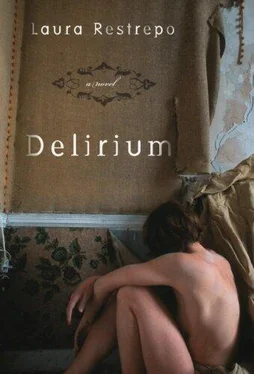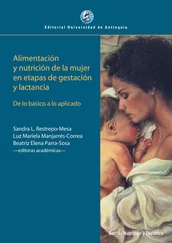Sitting at the window, Agustina is gazing out with such a lost air that she seems to exist out there, at the point of escape toward which she’s directing her gaze, and not within the four walls of the apartment that enclose her. I look at her and remember a phrase that suddenly takes on new meaning: the beautiful indifference of hysteria. Agustina is silent and indifferent, shedding language as one might remove a superfluous adornment. Aunt Sofi tells me that hours earlier she’d helped Agustina wash her hair with chamomile shampoo and that afterward, upon seeing how calmly Agustina was drying her hair with a brush and the hair dryer, she left her alone for a minute while she busied herself in the kitchen. Minutes later she missed the sound of the hair dryer and went up to see what was happening and found Agustina sitting where she is now, dazed, as still as a statue, with her hair half dried. That must have been at around five in the afternoon and since then Agustina hasn’t moved, or opened her mouth.
I beg Agustina to say something, a single word at least, but it’s hopeless, then I sit next to her, imitating the way she’s staring emptily into space, and after a while she opens her mouth and shows me her tongue: it’s horribly injured, raw, as if it’s been burned. Upon seeing this, a kind of howl escapes from my throat, alarming Aunt Sofi and making her come running. Feigning calm — I don’t know where the woman finds such composure — she carefully examines Agustina’s lacerated tongue, concludes that raw sugar is the only thing that’s good for curing sores inside the mouth and brings some on a plate. Agustina sticks out her hurt tongue and lets the sugar be put on it with the docility of an animal that’s been beaten, but no matter how many times I ask her how she’d done such a terrible thing to herself, she won’t explain. Aunt Sofi apologizes to me for her inexcusable negligence. If only you’d seen her in the bathroom a little while ago, using the hair dryer as if nothing was wrong, as if fixing her hair was the most natural thing in the world, as if tonight she was going out to eat or to the movies, as if she wasn’t sick or plotting to martyr herself as soon as I turned my back…I interrupt Aunt Sofi suddenly because a terrible thought has crossed my mind: Could Agustina have eaten glass? My God! Could she have eaten glass and be torn up inside, too? No, says Aunt Sofi, relax Aguilar, her tongue looks bad but it isn’t cut or bleeding; it looks as if it was burned. But with what? What could she have used to burn herself so hideously? I can’t take it anymore. I need to hide in the bathroom, cry a little. Cry without stopping for a day, two days, three.
Ever since she hurt her tongue, Agustina can’t speak or eat anything, so her only sustenance has been Pedialyte, a serum for dehydrated children. But today she refuses even that. With a glass of serum in her hand, Sofi implores her to take a sip, but Agustina pretends that she can’t hear her and when Sofi insists too much, she pushes the glass away sharply, then she comes to me, and struggling to speak the words, she says, I don’t like the yellow Pedialyte, Aguilar, I want the pink kind that comes in cherry flavor. Don’t make me laugh, Agustina, I tell her, and the truth is that I’m laughing as I haven’t laughed since the Sunday all this began, and despite the horror of seeing the incomprehensible way she’s hurt her tongue, I keep laughing to myself as I walk to the pharmacy to buy her the red cherry-flavored serum, because at certain exceptional moments, sometimes in the middle of the worst crises, normality seems to take pity on us and make brief appearances.
Last Tuesday, for example, after surviving a few horrendous days, Agustina and I had a period of quiet. It only lasted a little while, but it was heavenly. By seven I had finished making the day’s deliveries and I came home with my heart in my throat, not knowing how I would find her on my return, and to my great surprise she greeted me neither with the aloofness of her prayers nor with the wrath of her attacks, but with a warm smell of cooking that misted the windowpanes in the kitchen. And in the middle of that smell, a youthful, carefree-looking Agustina was making soup on the stove, and she said to me, as if nothing had happened, It’s a nice vegetable soup, Aguilar, I hope you like it. When I heard her I stood there frozen, paralyzed by surprise, not daring to move for fear that this incredible untroubled normality visiting my house for the first time in so many days would vanish; not kissing Agustina for fear of being rejected and at the same time fearing that her mood would change if I didn’t kiss her; not telling her about the round of deliveries that day to avoid bringing up the subject of the lady from Quinta Camacho, a nice person who lives alone with her cocker spaniel and who calls each month to order a sack of Purina, and with whom I’ve never exchanged more than thank-yous, she thanking me when I deliver her order and I thanking her when she pays me, and who nevertheless, I don’t know how, gradually became a source of suspicion for Agustina regarding my faithfulness; all of this was before the dark episode, of course, I’m talking about jealous scenes and silly fights that until recently were a part of our life as a couple and that bored me terribly, and that I nevertheless miss now.
So that Tuesday, when I found Agustina making vegetable soup, I just stood there in the middle of the kitchen doing nothing, holding a package from Only Supercenter with the black velvet panty hose that Aunt Sofi had requested by beeper, as if nourishing myself on that amazing tranquillity sure to vanish at any moment and not return for who knows how long, and it was Agustina herself who spoke first to say that if I was tired why didn’t I take a bath while she finished cooking, and she said it in the same cheerful voice she used to have before all this began. I went up to shower as she had suggested, and I stayed waiting in the bedroom, silent and trembling expectantly until she called me; she called me by my name, my last name, that is, with a shout that could almost be called happy. Soup’s ready, Aguilar, she shouted from the kitchen, and I went slowly down the stairs, step by step, so as not to break the spell; she filled three bowls, one for me, one for Sofi, and one for herself, setting them on the table with hot French bread, and we sat down and ate in silence. But it was a silence without recriminations or tensions, a relaxed and benign silence that made me believe that we were finally beating it, that now we were almost home free, that Agustina was being cured of whatever it was that had come over her.
A little while later she climbed in bed on my side, entwined her legs with mine, turned on the television and said, How nice, The Pest is on, it’s been so long since I’ve seen it, and she started to laugh at some of the characters’ jokes and I laughed, too, cautiously, alert to any sign, any change, remembering that a few months ago I would have been annoyed if she had interrupted my reading by turning on the television, I wouldn’t have said anything but it would have annoyed me, especially if the show was a mindless one like The Pest , and to think that the very same action that would have bothered me before now brought me back to life, as if this was all life needed to be, as if The Pest ’s jokes were enough, and with Agustina still peaceful I surprised myself by being prepared to kneel down to give thanks, and I would have done it if I’d known to which god I owed the miracle. Agustina watched television and I watched her, her face familiar and beautiful again, as if the evil fog had cleared at last. But when The Pest was over and I asked her whether she wanted to turn the television off now, she looked at me again with a blank expression on her face and I knew that the respite was over.
Читать дальше












